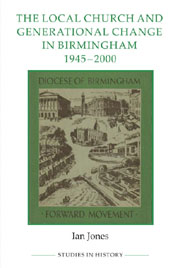Book contents
- Frontmatter
- Contents
- List of figures and tables
- Acknowledgements
- Abbreviations
- Map of Birmingham
- Introduction
- 1 Birmingham: the city and its churches
- 2 The spectre of ‘decline’
- 3 Church, youth and family from the 1940s to the 1960s
- 4 Life and worship in the local congregation
- 5 Church and neighbourhood: four congregational stories
- 6 Towards the margins: being Christian in a pluralist society
- Conclusion
- Appendix: Oral history
- Bibliography
- Index
Introduction
Published online by Cambridge University Press: 05 February 2013
- Frontmatter
- Contents
- List of figures and tables
- Acknowledgements
- Abbreviations
- Map of Birmingham
- Introduction
- 1 Birmingham: the city and its churches
- 2 The spectre of ‘decline’
- 3 Church, youth and family from the 1940s to the 1960s
- 4 Life and worship in the local congregation
- 5 Church and neighbourhood: four congregational stories
- 6 Towards the margins: being Christian in a pluralist society
- Conclusion
- Appendix: Oral history
- Bibliography
- Index
Summary
In January 1968 the bishop of Birmingham, Leonard Wilson, wrote in his diocesan newsletter of the fresh ideas sweeping English society in the preceding years. Discernment was crucial, he argued, but a wholesale rejection of change risked quenching the Spirit of God at work in the world. Special wisdom was needed regarding relations between young and old:
The problems of communication between the different generations … which exercise the minds of thoughtful people today, will always remain.… When we want to understand the people of other countries we know we must learn their language, and between the generations there is also a different language. We may not like that new language, but if we are to understand people we must be ready and even eager to learn it.
The bishop's words were powerfully emblematic of the way in which, by the 1960s, relations between young and old had become a hotly-debated social question. Youth was frequently identified with new social and political agendas that gave short shrift to authorities and institutions – including organised religion. The assertive self-confidence of youth – expressed in myriad ways from student protests to gang violence – was widely discussed in politics, the arts and media. ‘Teenagers’ (a comparatively recent coinage) were increasingly conspicuous as consumers and the fashions and tastes that they adopted were often consciously distinct from those of their parents. For themselves, adult observers often spoke of a ‘generation gap’ and anxiously discussed its causes.
- Type
- Chapter
- Information
- Publisher: Boydell & BrewerPrint publication year: 2012



